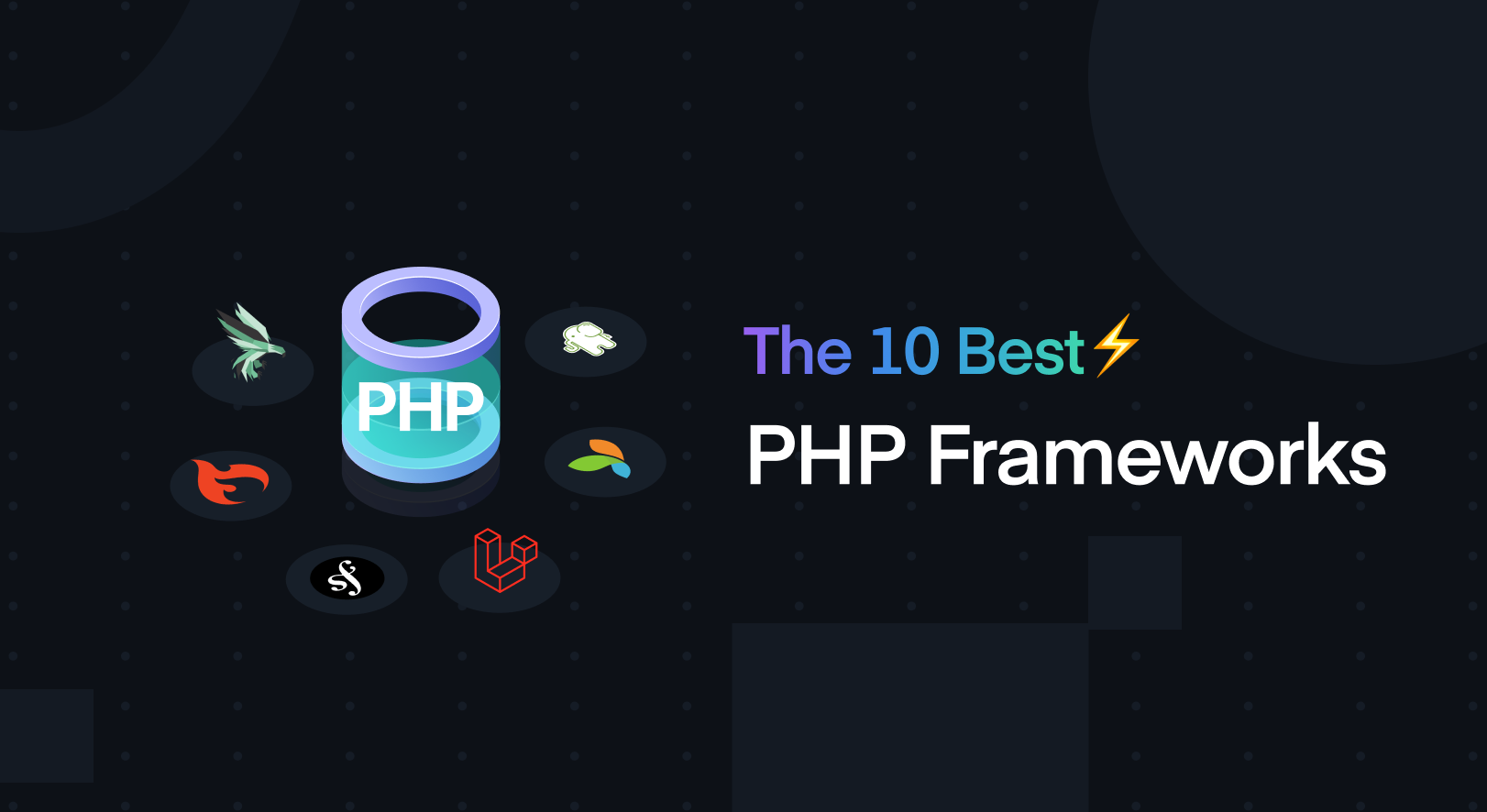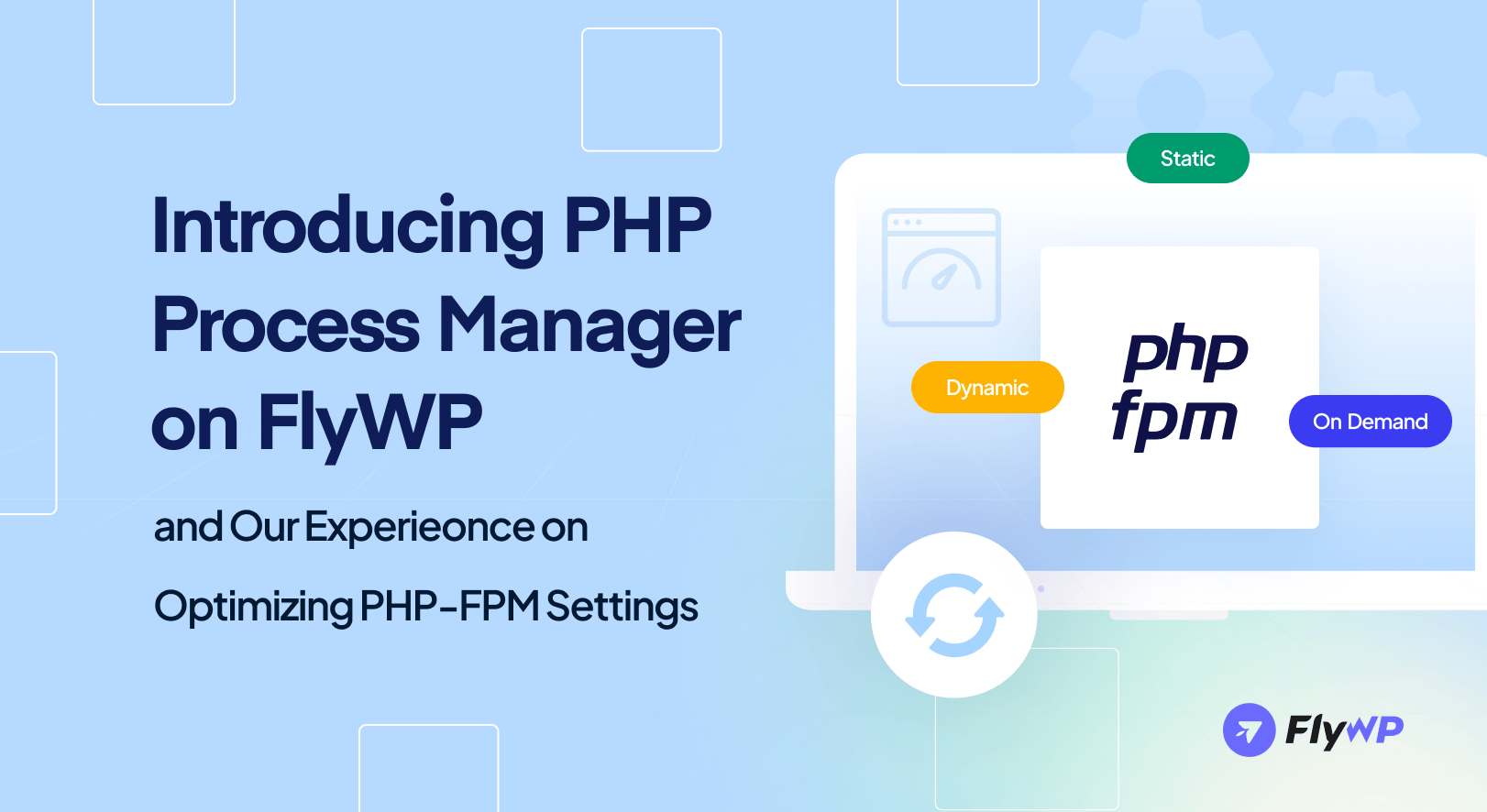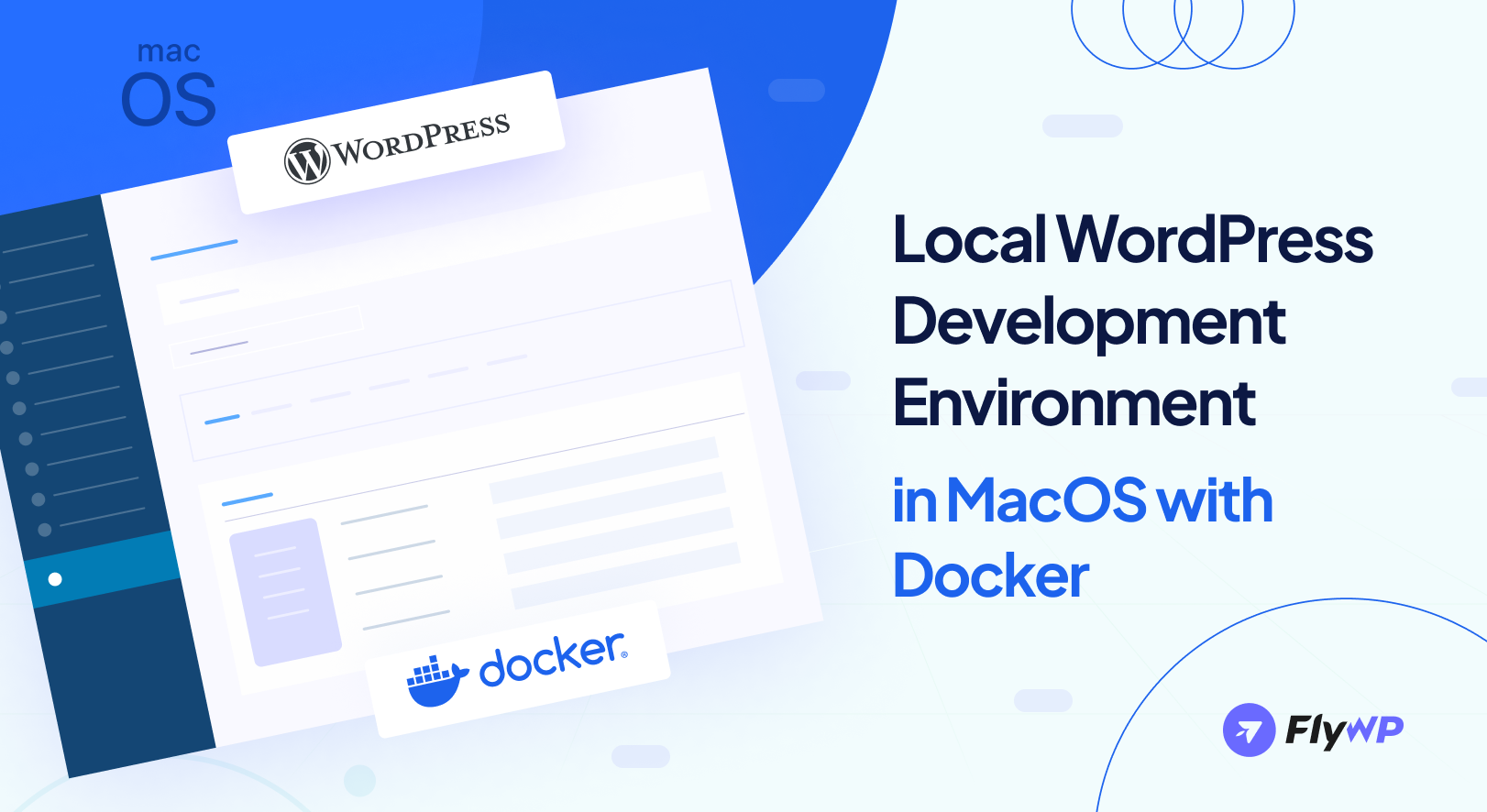PHP frameworks help developers build robust, scalable, and secure web applications efficiently. These frameworks provide a structured and precise environment to help software developers execute their thoughts into realities.
However, whether you’re a junior developer or a senior, these latest PHP frameworks will help you with large-medium projects. No worries, we have compiled a list of the top 10 PHP frameworks for 2024.
Here we’ll be talking about their:
- Features.
- Pros and cons.
- Best use cases for the perfect implementation.
After that, we believe that you’ll be able to choose the right one depending on your needs and requirements. Let’s check The 10 Best PHP Frameworks and discover which one suits your development style the best.
Why use a PHP framework?
Using a PHP framework offers numerous advantages that can significantly enhance your web development process. These frameworks provide a structured approach to development, incorporating best practices and standardized tools that simplify many aspects of coding.
Here are the key reasons why you should consider using a PHP framework:
1. Efficiency
- Streamlined development: PHP frameworks provide built-in tools and libraries that automate common tasks, such as database interactions, form validation, and session management.
- Save time: By using these pre-built components, developers can save time and focus on writing the unique parts of their applications rather than reinventing the wheel.
2. Security
- Built-in security features: PHP frameworks come with built-in security features that help protect your application from common threats.
- Best practices: These frameworks follow best security practices, ensuring that your application has a solid security foundation.
3. Scalability
- Handle growth: PHP frameworks are designed to scale with your project, whether you’re building a simple website or a complex web application.
- Structured architecture: They provide a structured architecture that makes it easier to manage and expand your application over time, ensuring it can handle increased traffic and data loads.
4. Maintenance
- Best coding practices: PHP frameworks promote best coding practices such as MVC (Model-View-Controller) architecture, which separates the application’s logic from its presentation.
- Ease of management: This separation makes it easier to manage and maintain code, as developers can work on different parts of the application without affecting others.
5. Performance
- Optimized for performance: PHP frameworks are optimized for performance, with efficient coding practices and caching mechanisms that help speed up your application.
- Selective components: They allow you to use only the components you need, reducing the overall load and improving performance.
6. Consistency
- Enforced standards: PHP frameworks enforce coding standards and best practices, ensuring that your codebase remains clean and consistent.
- Team collaboration: This makes it easier for multiple developers to work on the same project and ensures that new developers can quickly get up to speed.
7. Rapid development
- Scaffolding features: Frameworks like Laravel and Symfony offer features such as scaffolding, which allows developers to quickly generate the basic structure of an application.
- Faster prototyping: This capability enables faster prototyping and reduces the time to market, which is especially valuable in agile development environments.
Using a PHP framework can make your development process more efficient, secure, scalable, and maintainable. It provides a solid foundation for building high-quality web applications, allowing you to focus on creating innovative features and delivering a great user experience.
What to consider before selecting the best PHP framework
When selecting a PHP framework, it’s important to consider specific criteria to ensure it aligns with your project requirements. The appropriate framework can have a significant impact on your development efficiency and the long-term success of your project.
Here are the key factors to consider:
- Ease of use: Evaluate how straightforward the framework is to learn and use. Opt for frameworks with extensive documentation and active community support to ease the learning process.
- Community support: Look for frameworks with a large and active community that can offer support, share knowledge, and provide plugins or extensions. A strong community is invaluable for troubleshooting and best practices.
- Documentation: Ensure the framework provides clear, comprehensive documentation that covers all aspects of development, from setup to deployment.
- Performance: Assess the framework’s performance under load. Choose frameworks known for their speed and resource efficiency, particularly if you anticipate high traffic.
- Features: Identify frameworks that offer the necessary features, such as ORM (Object-Relational Mapping), authentication, and routing. Built-in features can significantly reduce development time and effort.
- Flexibility: Determine how flexible the framework is in terms of customization and extending functionality. Ensure it can adapt to your specific project requirements.
- Scalability: Consider the framework’s ability to scale with your project. It should be capable of handling growth in terms of both traffic and functionality.
By evaluating these criteria, you can select a PHP framework that aligns with your project requirements, development skills, and long-term goals. The right choice will streamline your development process and support your application’s growth and maintenance.
✅ We’re referring you to have a check on how to secure WordPress in a Docker environment. Also, get some hands-on experience through it
The 10 Best PHP Frameworks
Choosing the right PHP framework can make a significant difference in the efficiency, security, and scalability of your web development projects. With many options available, it’s essential to understand the strengths and unique features of each framework.
In this section, we will give an overview of the top 10 PHP frameworks, providing insights into their key features, pros, cons, and ideal use cases. Whether you’re a seasoned developer or just starting, this guide will help you select the framework that best fits your project’s needs.
Here are the top 10 PHP frameworks to consider for your next project development:
01. Laravel
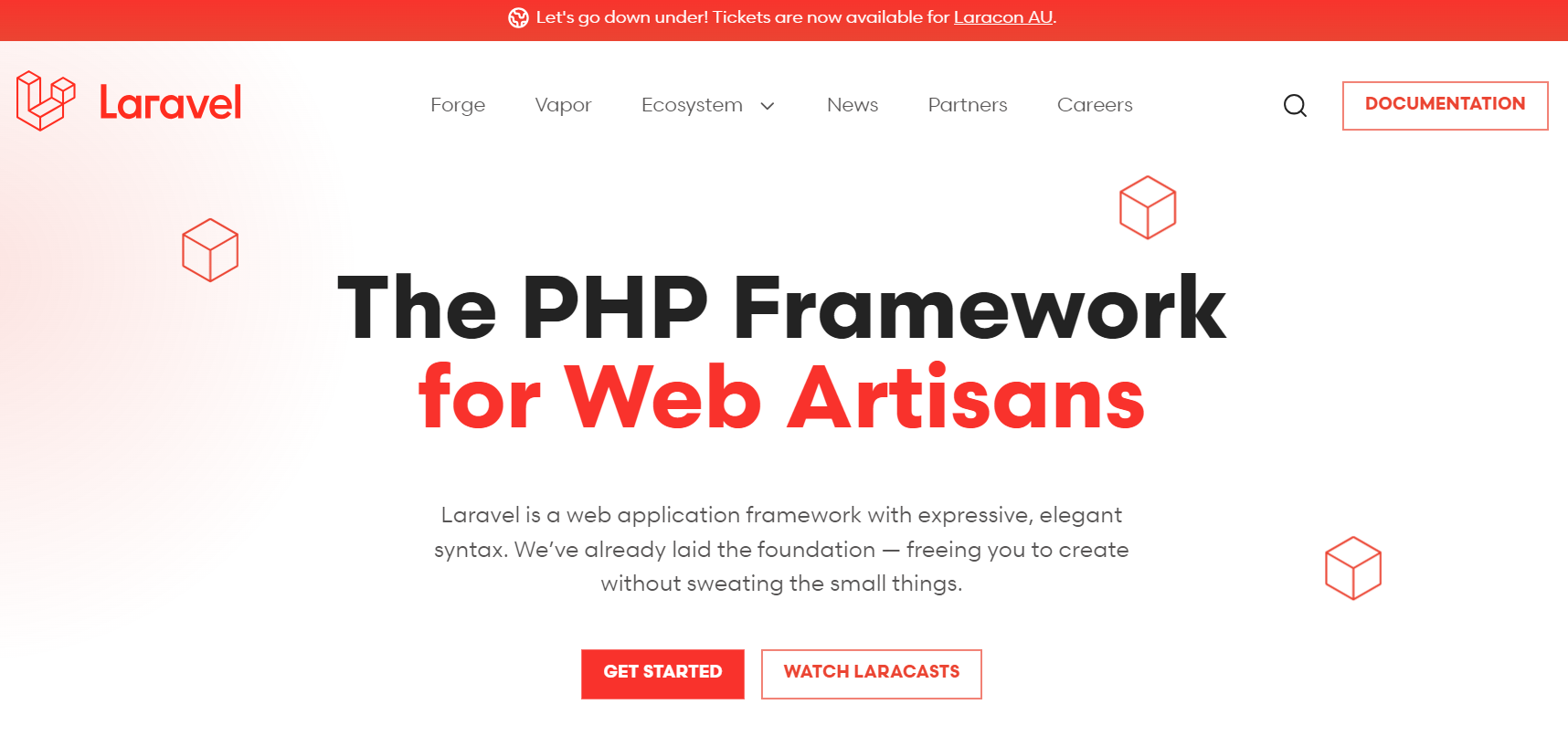
Laravel is one of the most popular PHP frameworks. It’s known for its clean syntax and powerful tools. Laravel makes common tasks like routing, authentication, and caching easier. This framework offers a great environment for web development with its wide range of features.
Key features of Laravel
- Eloquent ORM helps you work with databases easily by using a simple and clear syntax.
- Blade lets you create dynamic web pages effortlessly. It has features like template inheritance and sections for reusable code.
- Laravel has built-in tools for managing user logins and roles, making it easy to secure your application.
- The scheduler lets you automate routine tasks like sending emails or cleaning up the database directly within Laravel.
- Artisan is Laravel’s command-line tool that helps you with tasks like database migrations, running tests, and creating custom commands.
Pros
- Laravel offers detailed and well-organized documentation, making it easy to learn and find solutions.
- A big, active community means you have access to many tutorials, forums, and third-party packages.
- Laravel has a wide range of built-in libraries and tools that cover many functionalities, reducing the need for additional packages.
Cons
- Laravel’s extensive features can be too much for small or simple projects. In these cases, a simpler framework might be better.
Use cases
Laravel is great for complex web applications that need robust features and scalability.
Here are some examples:
- Laravel’s tools and libraries are perfect for building complex e-commerce sites with secure user logins, product management, and order processing.
- Laravel’s flexibility and rich features make it ideal for creating custom CMS platforms.
- Laravel is perfect for any custom web app that needs advanced features like user management, data processing, and task scheduling.
With Laravel’s powerful features and strong community support, you can build high-quality, scalable, and maintainable web applications easily.
02. Symfony
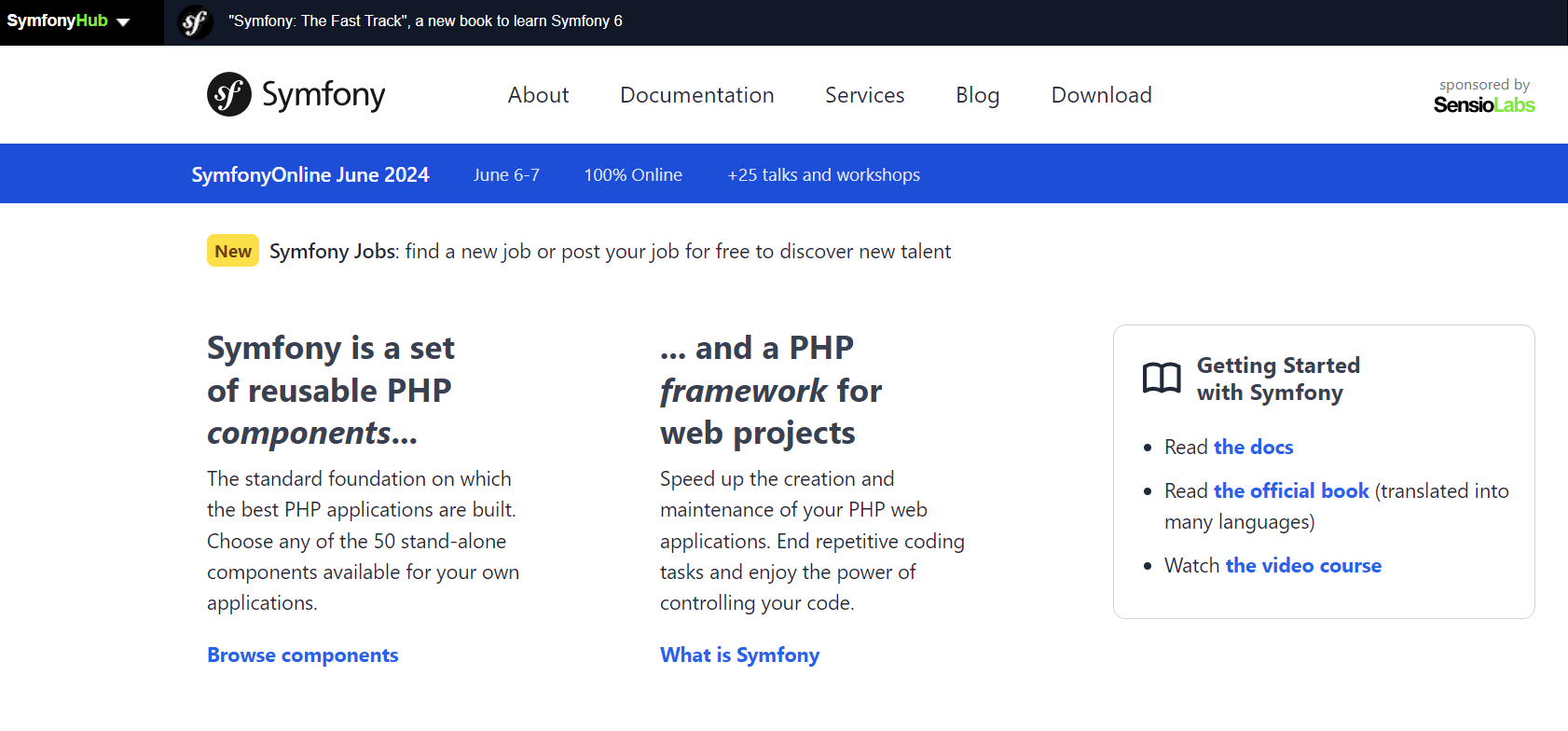
Symfony is a flexible, scalable, and powerful PHP framework. It provides reusable PHP components and is known for its stability and reliability. Symfony is a great choice for developers who need a robust and versatile framework.
Key features of Symfony
- Symfony offers many reusable components that you can use in various parts of your application.
- Twig is a fast and secure templating engine that helps you create dynamic web pages easily.
- It includes a debugging toolbar that helps you identify and fix issues quickly.
- It has detailed documentation that helps you learn and solve problems efficiently.
- You can use Symfony components independently, integrating them into other projects or frameworks as needed.
Pros
- Symfony is very flexible, allowing you to customize it to fit your project’s needs.
- It offers strong performance and can handle complex applications.
- Symfony has an active community that provides support, tutorials, and third-party packages.
Cons
- Symfony can be harder to learn, especially for beginners.
- It requires more configuration compared to some other frameworks, which can be challenging for new users.
Use cases
Symfony is best suited for enterprise-level applications and projects that require a high degree of customization.
Examples include:
- Symfony’s flexibility and scalability make it ideal for large, complex enterprise applications.
- If your project needs a lot of customization and specific features, Symfony is a great choice due to its modular components.
Symfony’s robust features and strong community support make it a powerful tool for building complex and highly customized web applications.
03. CodeIgniter
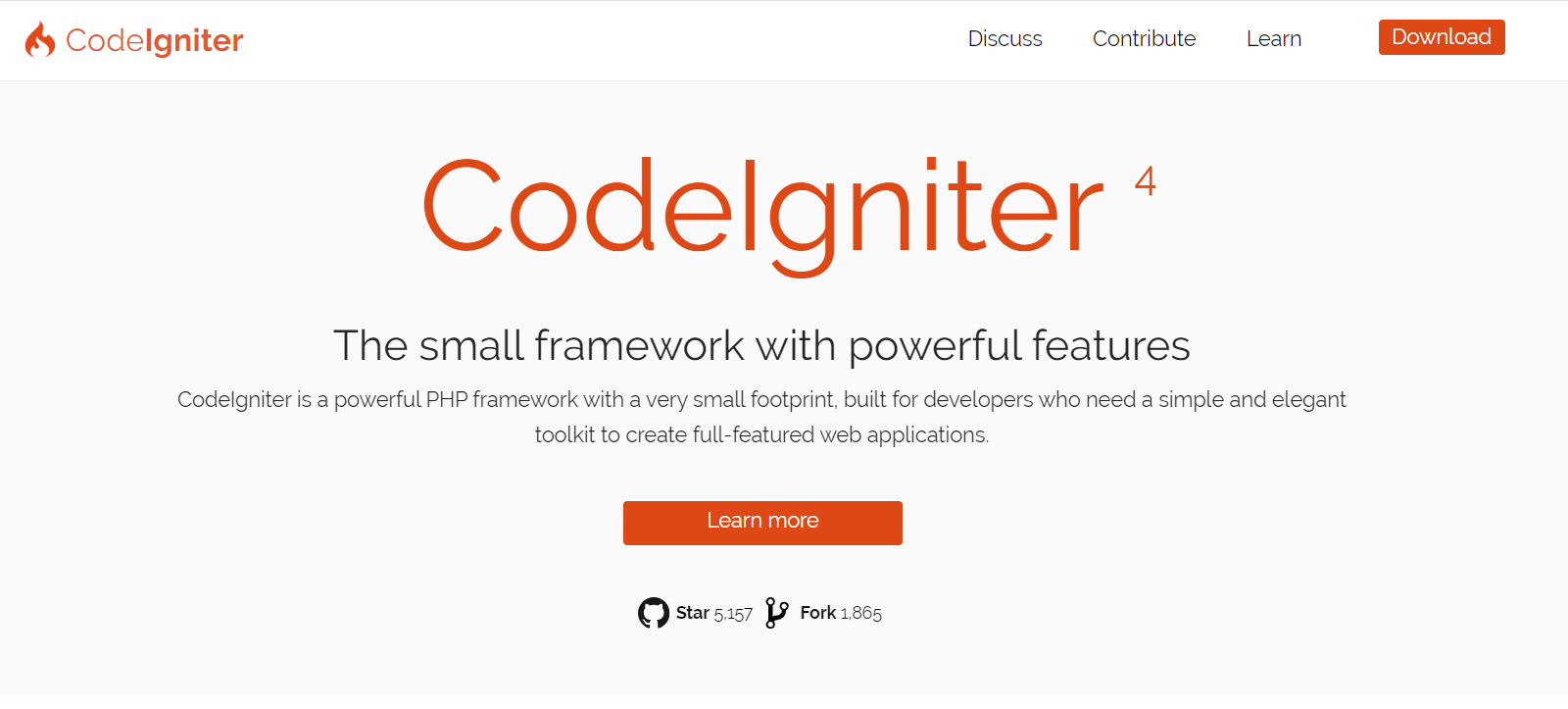
CodeIgniter is a lightweight PHP framework known for its speed and small footprint. It’s designed for developers who need a simple and elegant toolkit. CodeIgniter is ideal for building applications quickly without a lot of overhead.
Key features of Codelgniter
- CodeIgniter provides clear and concise documentation, making it easy to learn and use.
- It uses the Model-View-Controller (MVC) architecture, which helps organize code and separate logic from presentation.
- CodeIgniter includes various built-in libraries and helpers that simplify common tasks like form validation, session management, and email handling.
- CodeIgniter offers great flexibility with minimal coding rules, allowing developers to structure their applications as they see fit.
- The simplicity and ease of use make CodeIgniter a good choice for beginners and experienced developers alike.
Pros
- CodeIgniter is known for its speed, making it a good choice for applications where performance is critical.
- It has minimal server requirements, allowing it to run on a variety of hosting environments.
- The straightforward documentation and simple setup make it easy for new developers to get started quickly.
Cons
- CodeIgniter is not as modular as some other frameworks, which can make it less suitable for very large or complex applications that require extensive customization.
Use cases
CodeIgniter is great for small to medium-sized projects, especially where speed and simplicity are essential.
Examples include:
- CodeIgniter’s simplicity and speed make it a good choice for small business websites that need to be developed quickly and efficiently.
- For projects that don’t require extensive customization or complex features, CodeIgniter provides an efficient and straightforward solution.
- Its easy setup and minimal configuration make CodeIgniter ideal for quickly prototyping new ideas and concepts.
CodeIgniter’s lightweight nature, combined with its speed and simplicity, make it a powerful tool for building efficient and straightforward web applications.
🔔 A quick tip: Learn the Top 10 VPS Providers for Reliable Mail Server
04. Yii
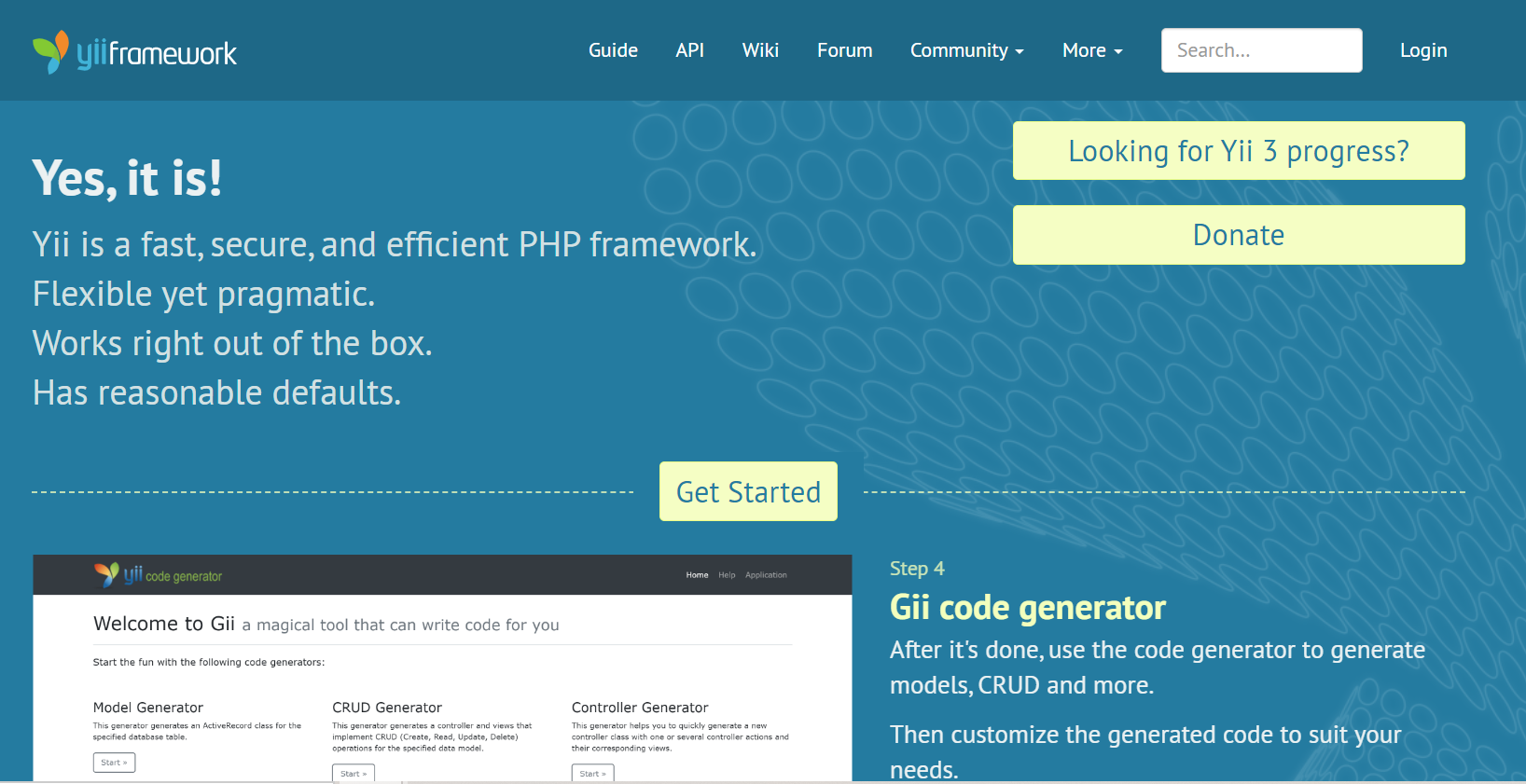
Yii is a high-performance, component-based PHP framework designed for developing large-scale web applications. It’s known for being fast, secure, and highly extensible, making it a powerful choice for complex projects.
Key features of Yii
- Yii uses a component-based architecture, allowing you to build applications with reusable and interchangeable components.
- Gii is a powerful tool that helps you generate code quickly, such as models, controllers, and forms, speeding up the development process.
- Yii offers various caching mechanisms, which can significantly improve your application’s performance.
- Yii includes built-in security features to protect against common threats like SQL injection, cross-site scripting (XSS), and cross-site request forgery (CSRF).
- Yii allows you to integrate easily with other libraries and tools, enhancing its functionality and flexibility.
Pros
- Yii is optimized for performance, making it ideal for high-traffic applications.
- It provides comprehensive security features to help you build secure applications.
- Tools like the Gii code generator and the component-based approach make development faster and more efficient.
Cons
- Yii can be challenging for beginners due to its extensive features and component-based structure.
Use cases
Yii is ideal for complex projects that require high performance and extensive features.
Examples include:
- Yii’s performance and security features make it suitable for building secure and efficient e-commerce platforms.
- For large portals that need to manage vast amounts of content and users, Yii’s component-based architecture provides a solid foundation.
- Yii can handle the requirements of large forums, offering scalability and robust performance.
Yii’s combination of high performance, security, and extensibility makes it a top choice for developing complex and large-scale web applications.
05. Laminas (formerly Zend)
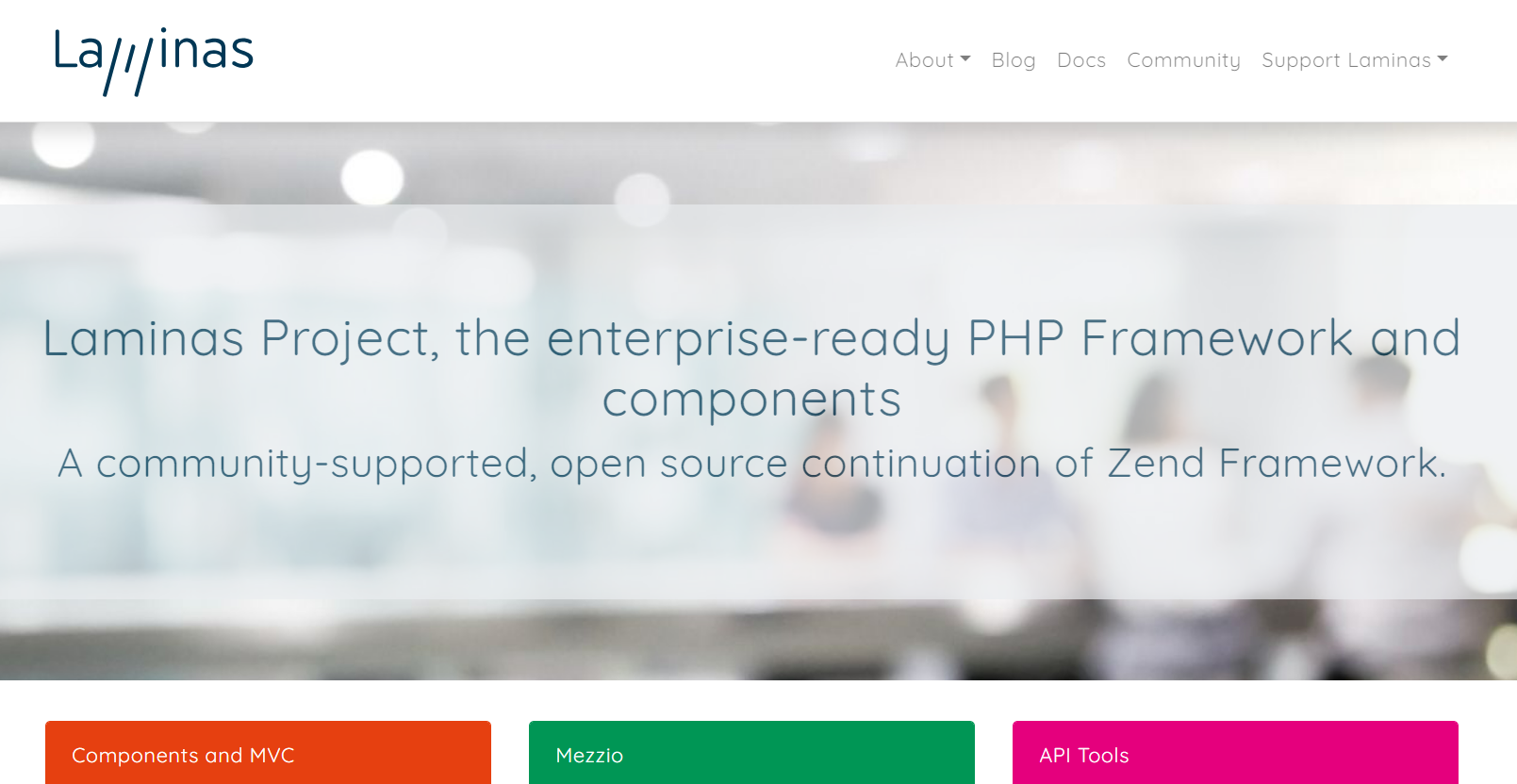
Zend Framework, now transitioned to the Laminas Project, is a collection of professional PHP packages with over 570 million installations. It’s designed for building high-performance applications.
Key features of Laminas
- Laminas uses an object-oriented approach and follows the Model-View-Controller (MVC) architecture, which helps in organizing and managing code efficiently.
- It provides robust security features to protect applications from common threats.
- Laminas offers detailed documentation and tutorials, making it easier to learn and implement.
- You can customize and extend Laminas to meet specific project needs.
Pros
- Laminas is highly flexible, allowing for extensive customization.
- It is designed for building enterprise-level applications.
- Laminas has a strong community that offers support and resources.
Cons
- It can be challenging to learn, especially for beginners.
- Setting up and configuring Laminas can be more complex compared to other frameworks.
Use cases
Laminas is perfect for enterprise applications and services that require high performance and scalability, such as:
- Ideal for large-scale, complex enterprise applications needing robust features and scalability.
- Suitable for services that demand high performance and reliability.
06. Phalcon
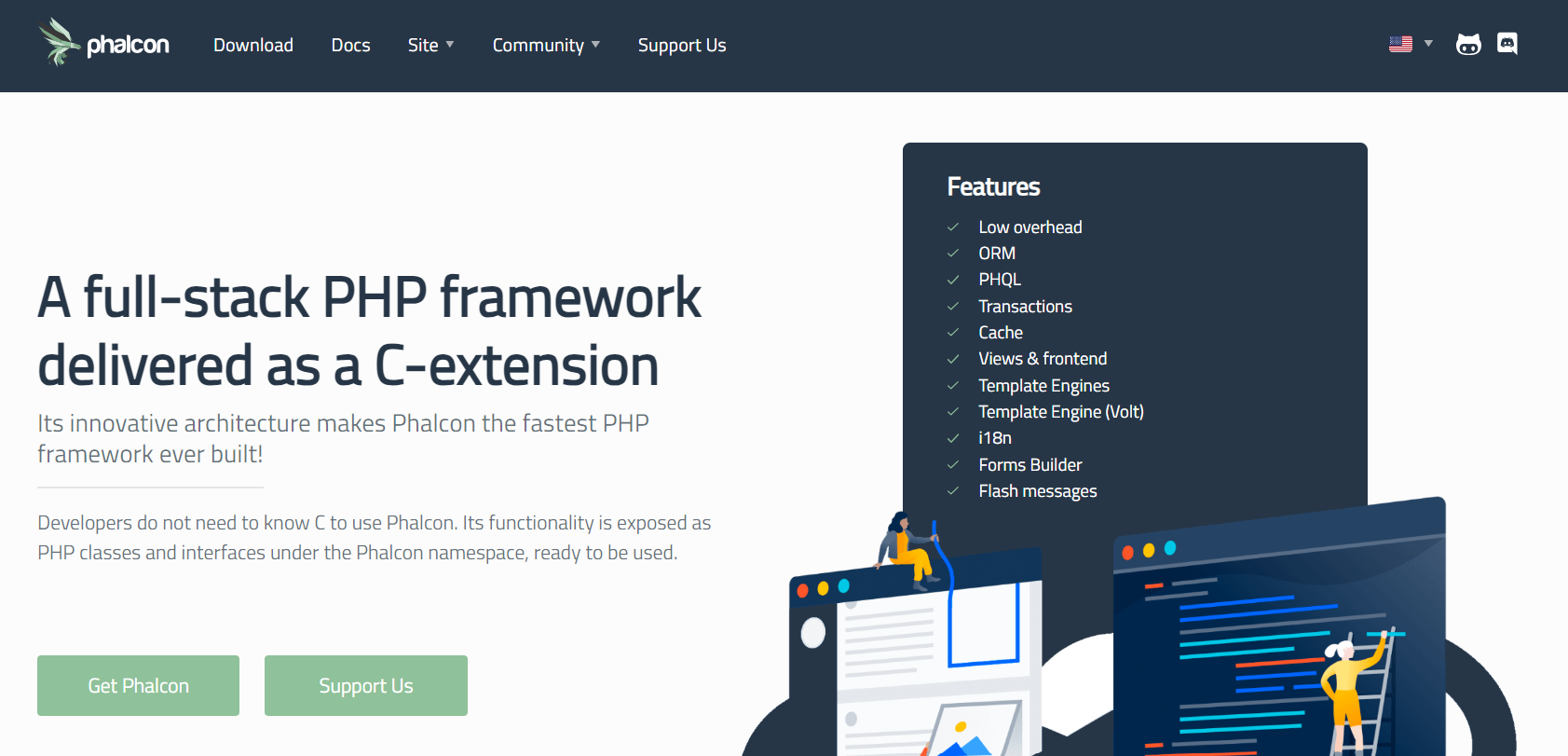
Phalcon is a web framework implemented as a C extension, which offers exceptional speed and low resource usage. It is known for its high performance and efficient resource consumption.
Key features of Phalcon
- Phalcon’s C extension architecture allows it to execute tasks very quickly.
- It interacts closely with the server, offering lower-level operations for better performance.
- Phalcon follows the Model-View-Controller (MVC) architecture, helping organize and manage code effectively.
- It provides support for both Object-Relational Mapping (ORM) and Object-Document Mapping (ODM), facilitating database interactions.
- Phalcon includes the Volt Templating engine, which is fast and easy to use for creating dynamic web pages.
Pros
- Phalcon is extremely fast due to its C extension.
- It uses fewer resources, making it efficient even on less powerful servers.
- Phalcon offers a comprehensive set of features for building web applications.
Cons
- Developers need to understand its C extension implementation, which can be challenging.
- Phalcon is less popular compared to other frameworks, which can mean fewer community resources and third-party packages.
Use cases
Phalcon is best for performance-critical applications, such as:
- Ideal for applications that require real-time data processing and high-speed performance.
- Suitable for websites that experience high traffic and need to handle many concurrent users efficiently.
Phalcon’s unique architecture and performance advantages make it a strong choice for building fast, resource-efficient web applications.
07. Slim
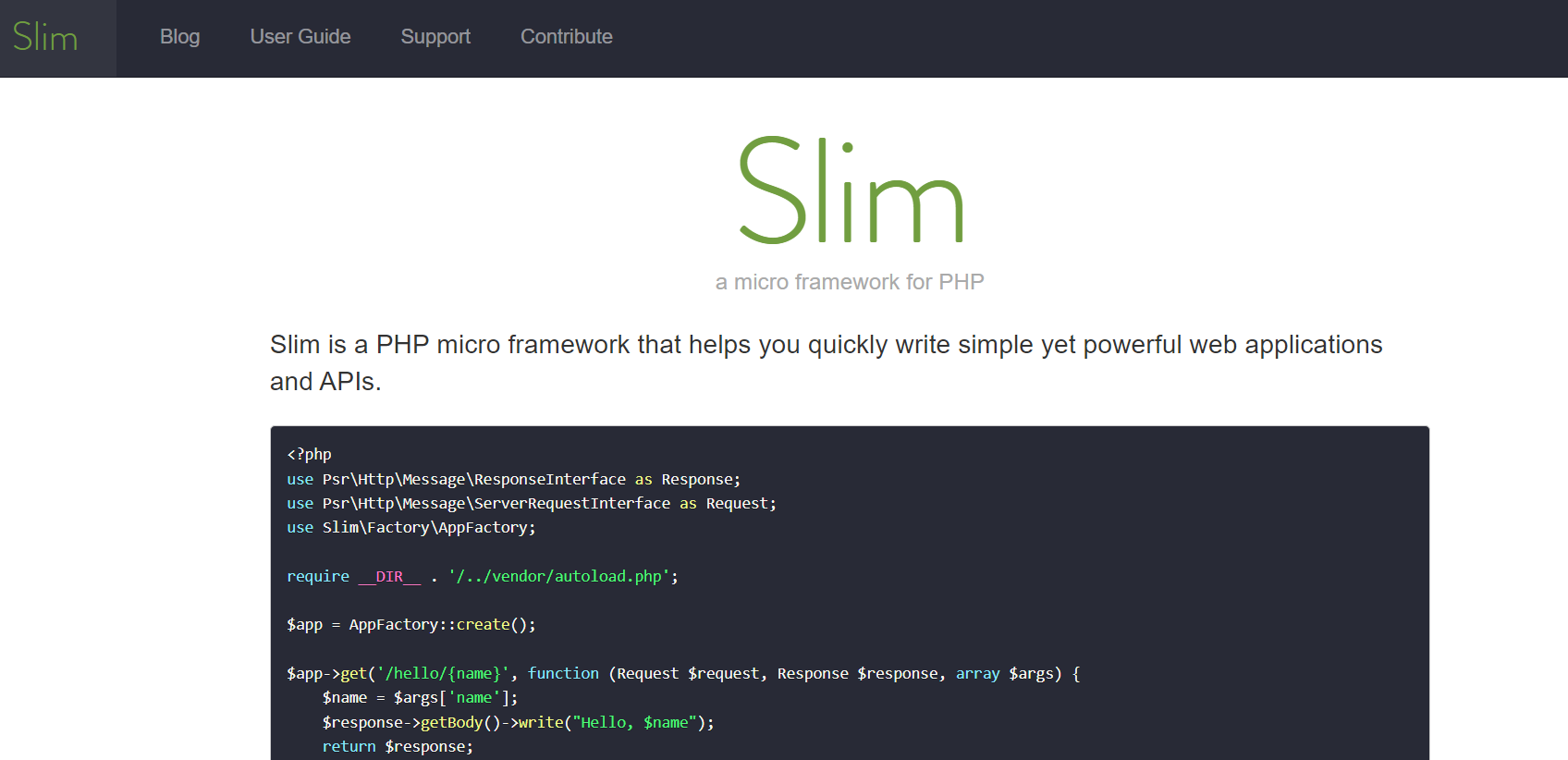
Slim is a micro framework that helps you quickly write simple yet powerful web applications and APIs. It’s known for being lightweight and fast.
Key features of Slim
- Slim is minimalistic, which makes it very fast and efficient.
- The documentation is easy to understand, making it accessible for beginners.
- Slim allows you to use middleware to extend its functionality.
- It includes a powerful URL router that helps manage your web routes effortlessly.
- Slim has a built-in dependency injection container, which makes managing dependencies simple.
Pros
- Slim’s simplicity makes it easy to learn and use.
- You can extend its functionality with middleware.
- Its lightweight nature ensures quick performance.
Cons
- It has fewer built-in features compared to larger frameworks.
- For more complex applications, you’ll need to integrate third-party components.
Use cases
Slim is ideal for small to medium-sized RESTful APIs and simple web applications, such as:
- Slim is perfect for building lightweight and fast APIs.
- It’s great for straightforward web applications that don’t require many features.
08. CakePHP
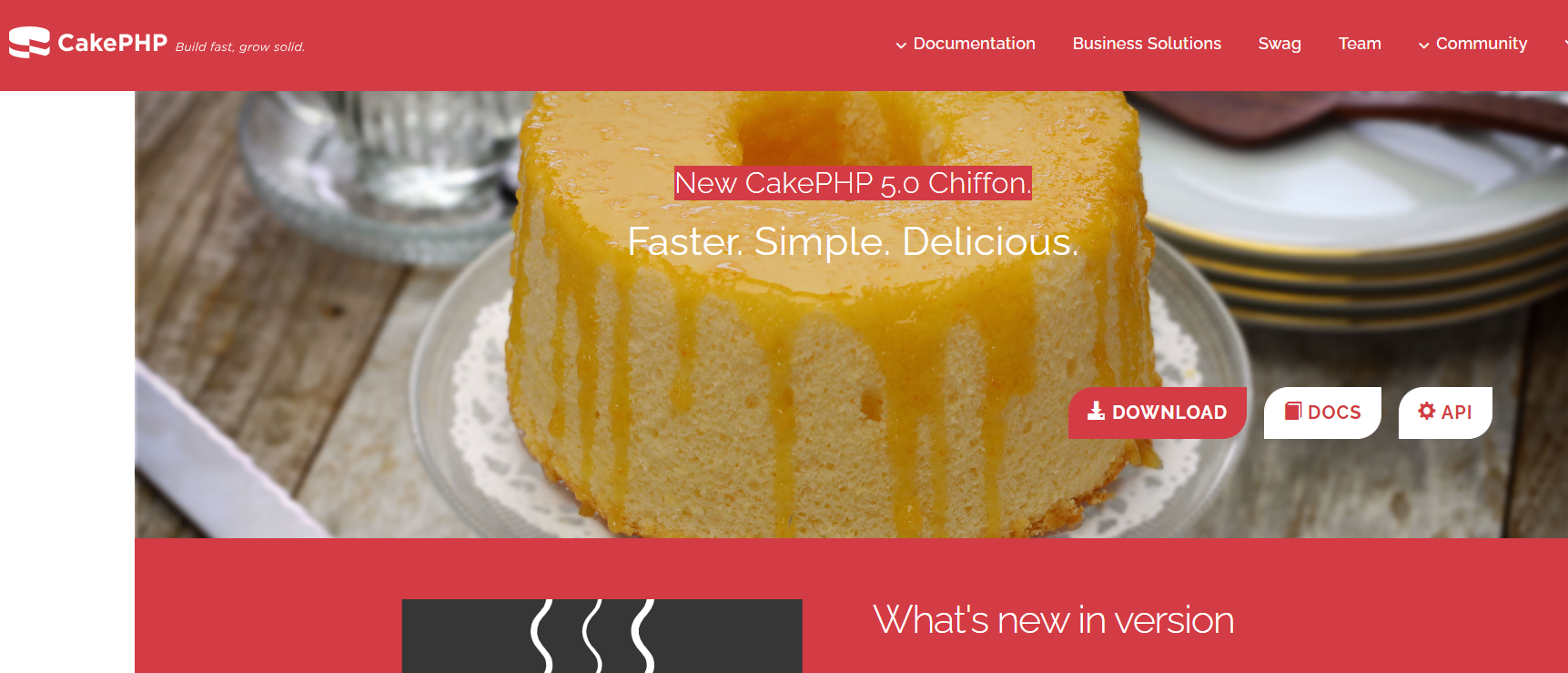
CakePHP is a rapid development framework that provides a structured framework for PHP development. It emphasizes convention over configuration.
Key features of CakePHP
- CakePHP uses conventions to reduce the need for configuration.
- It includes a powerful Object-Relational Mapping (ORM) system.
- CakePHP provides scaffolding features for the quick generation of basic CRUD (Create, Read, Update, Delete) functionality.
- It integrates with PHPUnit for testing your application.
- CakePHP includes security features like input validation and data sanitization.
Pros
- CakePHP allows for fast development with its scaffolding and conventions.
- It offers good performance for web applications.
- It has an active community that provides help and resources.
Cons
- The strict conventions might feel limiting to some developers.
- It’s less flexible compared to other frameworks that don’t enforce strict conventions.
Use cases
CakePHP is great for quick development of web applications with predefined structures, such as:
- Ideal for projects that fit well within the conventions of CakePHP.
- Useful for quickly building prototypes due to its scaffolding features.
09. FuelPHP
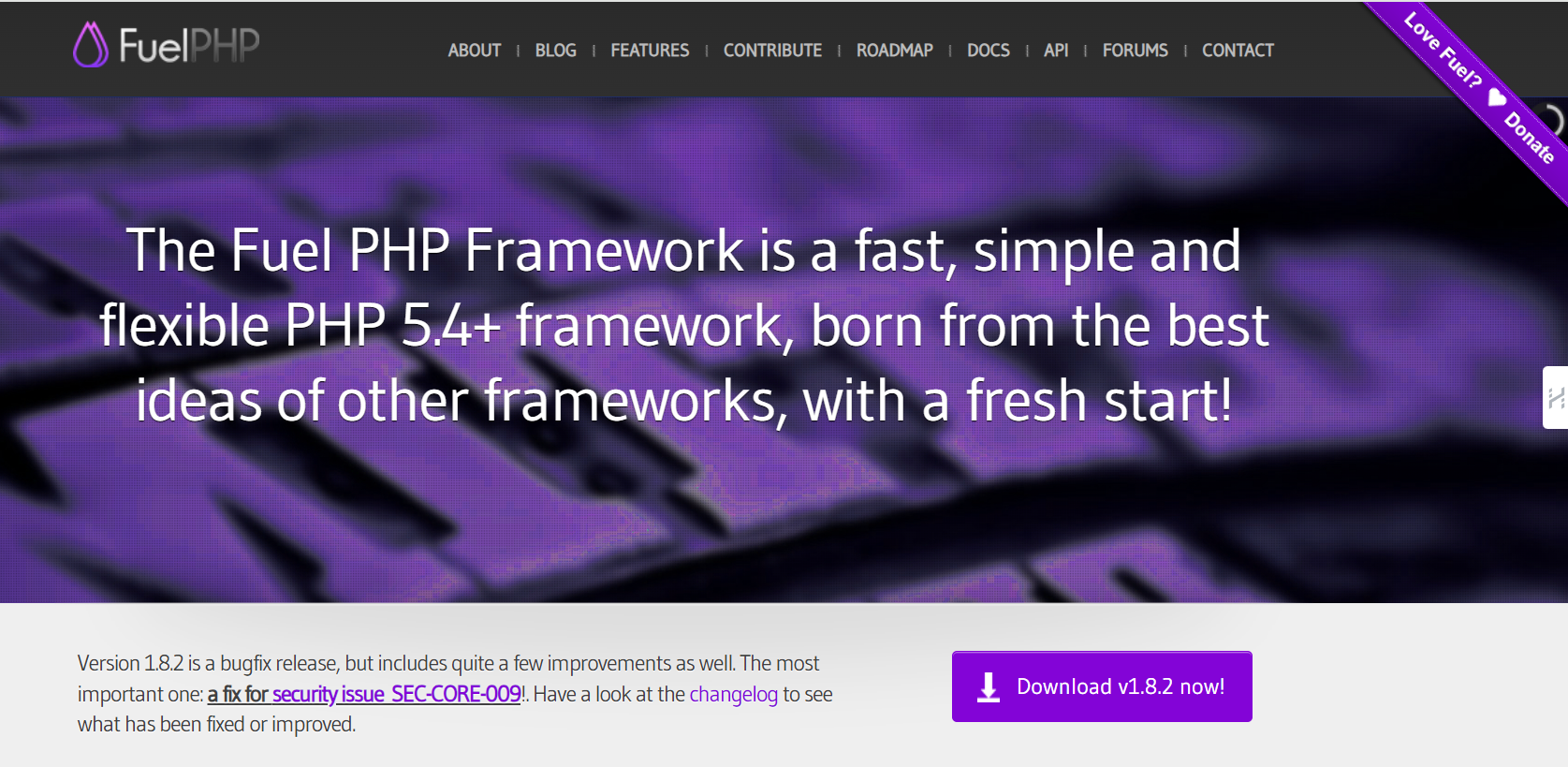
FuelPHP is a flexible, full-stack PHP framework that supports both MVC and HMVC architectures. It’s designed to be modular and secure.
Key features of FuelPHP
- FuelPHP supports Hierarchical Model-View-Controller (HMVC) architecture for better code organization.
- It has built-in support for creating RESTful applications.
- FuelPHP includes tools for parsing templates easily.
- It provides built-in ORM and authentication packages.
- FuelPHP includes various security features to protect your applications.
Pros
- Its modularity allows for flexible and reusable code.
- It has strong security features to protect your applications.
- It supports both MVC and HMVC architectures.
Cons
- FuelPHP has a smaller community compared to more popular frameworks.
- There’s less documentation available, which can make learning and troubleshooting harder.
Use cases
FuelPHP is suitable for developers who need a flexible framework for a variety of projects, such as:
- Ideal for projects that need custom architecture and flexibility.
- Great for applications that require strong security features.
10. PHPixie
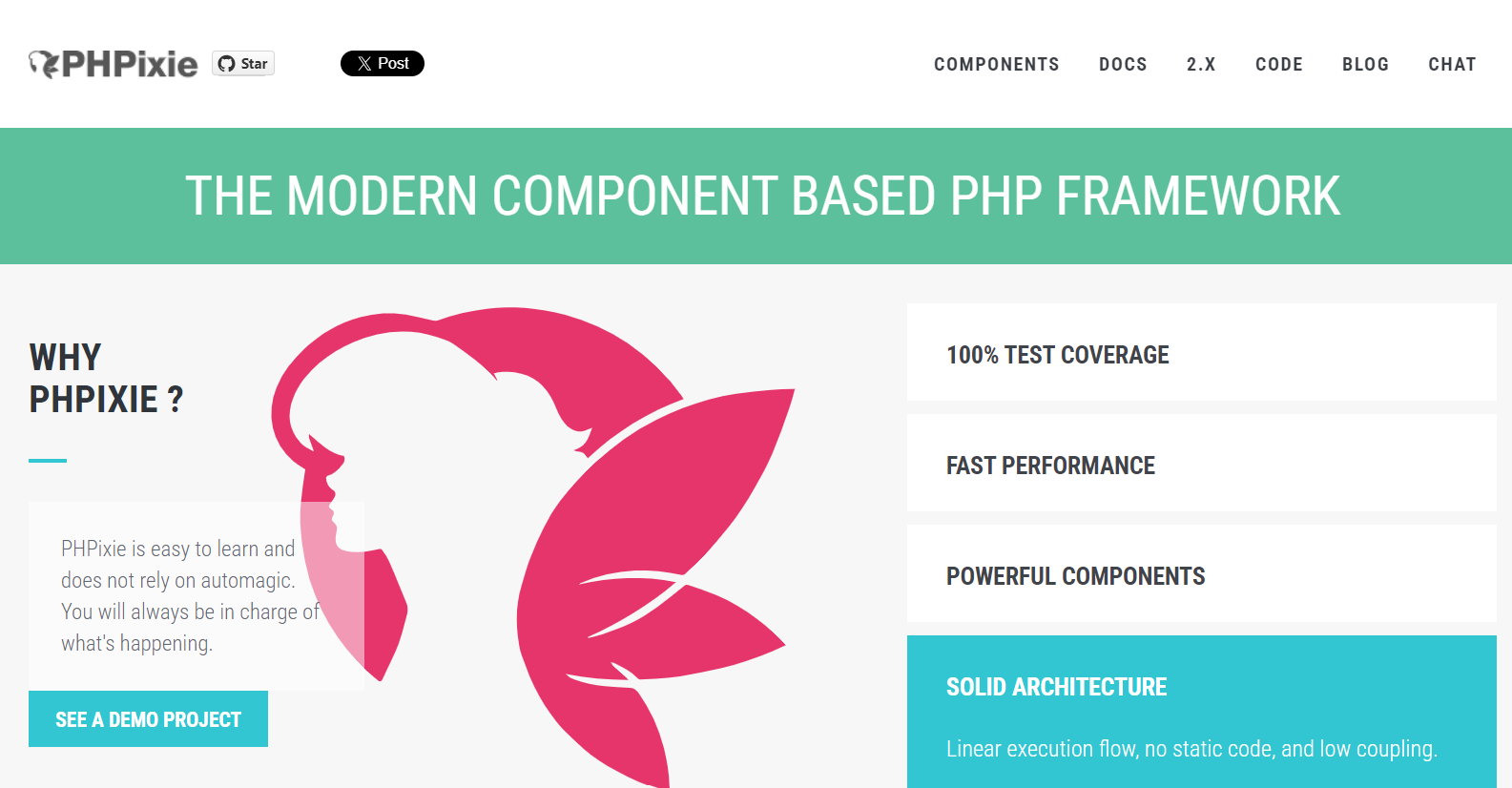
PHPixie is a lightweight PHP framework designed for high performance and ease of use. It’s modular and easy to get started with.
Key features of PHPixie
- PHPixie uses Hierarchical Model-View-Controller (HMVC) architecture.
- It’s designed to be lightweight, ensuring fast performance.
- PHPixie’s modular design allows you to use only the components you need.
- It’s simple to set up and start using.
- PHPixie includes a built-in ORM for easy database interactions.
Pros
- PHPixie is optimized for speed and performance.
- Its simplicity makes it easy to learn and use.
- Modular: You can use its components independently, adding flexibility.
Cons
- PHPixie has a smaller community, which can mean fewer resources and third-party packages.
- The documentation is not as extensive as some other frameworks.
Use Cases
PHPixie is perfect for developers looking for a simple, high-performance framework for small to medium projects, such as:
- Ideal for small to medium-sized web applications that need fast performance.
- Great for quickly building and testing prototypes due to its easy setup.
End note
When selecting a PHP framework, it’s important to consider your project requirements and your level of experience with the framework. Laravel and Symfony are well-suited for complex, large-scale applications, providing many features and robust community support. CodeIgniter and Slim are suitable for smaller projects where speed and simplicity are key. Yii is a good choice for high-performance, large-scale web applications, while Laminas is well-suited for enterprise-level projects that require extensive customization.
Phalcon is known for its exceptional performance and low resource usage, making it suitable for real-time systems. CakePHP is great for rapid development with its convention-over-configuration approach. FuelPHP offers flexibility and security, making it ideal for various projects. Finally, PHPixie is perfect for small to medium projects needing high performance and a simple setup.
By understanding the strengths and use cases of each framework, you can make an informed decision that best fits your project’s requirements and your development style. Each framework has its unique features and benefits, so evaluate your needs carefully to choose the most suitable one for your next project.
